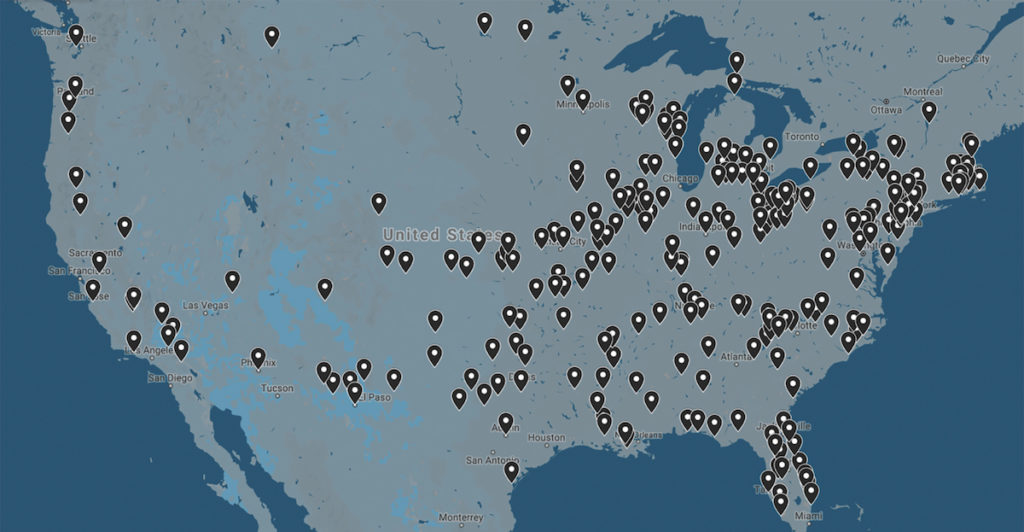PROVINCETOWN — Nineteen Gannett-owned weeklies across Eastern Massachusetts will cease print publication in May, according to recent announcements on the company’s “Wicked Local” websites. None of the 19 in the latest round of cuts is on Cape Cod, although in the last year Gannett (formerly GateHouse Media) has stopped printing the Register, covering Dennis, Yarmouth, and Barnstable, the Sandwich Broadsider, and the Bourne Courier.
Gannett’s corporate office did not respond to questions about plans for its three remaining print weeklies on the Cape: the Barnstable Patriot, the Cape Codder, and the Provincetown Banner.
Meanwhile, Northeastern University journalism professor Dan Kennedy reports in his Media Nation blog that all but three Gannett weeklies in Massachusetts will stop most of their local news coverage and transition to regional coverage. Just three weeklies — the Banner, the Old Colony Memorial in Plymouth, and the Cambridge Chronicle — will continue to cover some local news, according to Kennedy, citing anonymous sources at the company.
Gannett currently owns 65 weekly newspapers in Massachusetts. The company’s announcements about abandoning print included the statement “Now, more than ever, it’s critical to support local journalism.” The Boston Globe reported on April 8 that the 19 papers losing their print editions will effectively “disappear overnight.”
Mary Ann Bragg, the editor of the Banner, declined to comment, and Cape Codder editor Donna Tunney did not respond to a reporter’s inquiry. The Barnstable Patriot website does not list any staff members.
Seth Rolbein, a former editor of the Cape Codder, said on April 9 that when GateHouse bought the Cape Cod properties of the Community Newspaper Co. it promised to keep each paper’s local feel.
According to the Boston Business Journal, Gannett CEO Mike Reed earned $7.74 million in 2021. Gannett’s business model, Rolbein said, prioritizes investor profit and creates “lots of pressure to not reinvest for long-term returns and minimizes investment in journalistic resources.”
He said this loss of local news coverage is “profoundly dangerous.”
“Accountability plays a key role in good public process,” said Rolbein. “If we lose strong community journalism, we lose accountability.”
While the Cape Codder and Barnstable Patriot might retain their print editions, they will have limited resources, said Amy Saltzman, former editor of Gannett’s Cambridge Chronicle.
“Gannett pushed a one-size-fits-all model with no understanding of our individual communities,” Saltzman wrote in a March 25 email. Gannett executives “didn’t seem to care if we failed or succeeded,” she wrote. “There was a sense it would all be over soon anyway.”
With no reporters in her newsroom, Saltzman created a partnership in 2017 with Boston University, where she teaches a class on local journalism and has her students write for the Chronicle.
In 2020, Gannett switched its website and did not retain many Chronicle articles published before that on the new site. Saltzman said the company promised to republish those articles, but that has not yet happened.
“It felt like we were being erased,” Saltzman said.
Interest in Local News
In a Feb. 16 report, Kennedy quoted a Gannett content strategy analyst, Len LaCara: “There is ample evidence people will not subscribe to read a lot of the content currently being produced for the newspapers. We see this in the low subscription numbers and the lack of traffic to the stories.”
Kennedy was shocked. “That statement is one of the most astonishing things I’ve heard a local news executive say,” he told the Independent. “Gannett has been providing people with so little local coverage, I don’t think their executives are in any position to know whether their readers want local news or not.”
Kennedy has served as an adviser to the Provincetown Independent.
Tim Wood, editor of the independent Cape Cod Chronicle in Chatham, said on March 24 that Gannett’s newspapers have so few resources that they “just don’t have the content people want.”
The Chronicle covers Chatham, Harwich, and Orleans, which have also traditionally been covered by the Gannett-owned Cape Codder.
A weakened Codder is not necessarily a good thing for the Chronicle, Wood said. “It’s always good to have some competition,” he said.
Wood also addressed the appeal of print to his audience.
“A lot of people really like the feel of the newspaper,” he said. “You don’t have to worry about going through dozens and dozens of tabs just to find one story.
“Readers really care about what’s going on in their community,” Wood went on. “They want to know what’s happening with taxes and zoning. The information we provide at this grassroots level is what people really need to make decisions about their community and their lives.”
“As for the appeal of regional news,” wrote Kennedy, “isn’t that why we have the Boston Globe, public radio and television, and TV newscasts? I want local news from my local paper.”
Kennedy’s recent reporting included a Gannett slide show that detailed how current local reporters would have to apply for jobs with new regional beats. The final slide concluded with the message, “Stay calm and carry on.”
Thomas Lyons is the Independent’s Mary Heaton Vorse Community Journalism Fellow.

